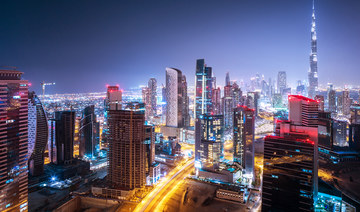RIYADH: UAE developers can leverage sustainability to add value to their properties, as new data shows that 70 percent of investors are willing to pay premiums for green facilities.
According to real estate firm Property Finder’s latest paper, this trend is driven by increasing consumer demand for sustainability in community design, with a strong preference for Leadership in Energy and Environmental Design, known as LEED, certification.
LEED is the world’s most widely used green building rating system, providing a framework for creating healthy, highly efficient, and cost-saving green buildings that offer environmental, social, and governance benefits.
Amidst notable success in the UAE’s real estate sector, which saw a surge in diversified demand and the highest volume and value of transactions in May, the report highlighted sustainability as a leading factor driving these demands.
Cherif Sleiman, chief revenue officer at Property Finder, said: “It is promising to see the growing conversation around sustainability in the industry, aligned with the broader national vision.”
Citing their latest findings, he noted that consumers are prioritizing this factor in their home-seeking journey, both within communities and across residential buildings.
Louise Heatly, owner and managing director at Exclusive Links Real Estate, noted that while cost can be seen as a challenge to eco-conscious living, it actually presents an opportunity in disguise.
“Developers can leverage sustainability as a unique selling point, capitalizing on the willingness of 70 percent of investors to pay premiums for green properties. Overcoming challenges through education and innovative financing models presents an avenue for Dubai to continue leading the charge toward a more sustainable future in real estate,” she said.
This aligns with the government’s various initiatives aimed at creating future cities that integrate sustainability and livability into their fabric, such as Dubai’s Clean Energy Strategy 2050 and Abu Dhabi’s Vision 2030 plan.
Kika Pavese, the managing director at MD Real Estate, noted a significant rise in consumer interest in green living, further highlighting that this shift reflects a broader awareness and commitment to sustainability among residents and investors.
“Among the challenges is balancing the expansion of projects like Masdar City and the forthcoming Aldar Sustainable City with the imperative of affordability for residents. Ultimately, the success of sustainable housing in the UAE will depend on a collaborative approach. One that includes government initiatives, private sector innovation, and public willingness to embrace a sustainable lifestyle,” she added.
Pavese mentioned that, on the opportunity front, the UAE’s embrace of renewable energy opens doors for solar-powered homes and communities, potentially incorporating energy-plus housing, where buildings generate more energy than they consume.
“There’s also potential for advancements in sustainable building materials, such as those that are recycled, locally sourced, or that reduce energy consumption,” she added.
According to the report, this new era is further underpinned by diversified visa policies launched by the nation.
Earlier this year, the UAE government introduced the Blue Residency Visa, a 10-year entry permit designed for individuals who have made significant contributions to the overall environment in the UAE.
The report underscores that this decision lays the foundation for increased sustainable choices nationwide, which could impact the real estate sector as well.
Commenting on this, Pavese highlighted that the Blue Residency Visa is “a game-changer” for the real estate market in Abu Dhabi, as it attracts a demographic seeking long-term stability while promoting investments in sustainable living.
“We expect this visa to significantly increase the demand for sustainable properties, as more residents look for homes that align with their environmental values and offer long-term cost savings,” the MD Real Estate official said.
For investors, she added, this is a substantial advantage, “as properties with sustainable solutions will see higher demand compared to those without.”
“This initiative is set to attract considerable international investment into the capital, positioning the UAE as a focal point on the global stage,” Pavese concluded.






















